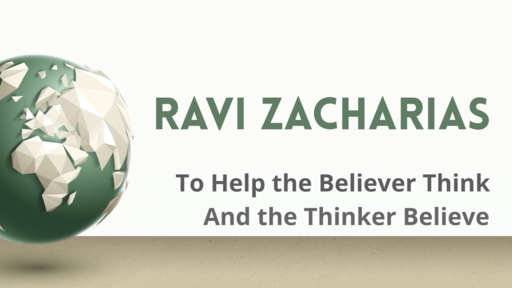Ravi Zacharias

Sermon • Submitted • Presented • 52:05
0 ratings
· 780 viewsFiles
Notes
Transcript
Ravi Zacharias
March 26, 1946 - May 19, 2020, 74 years old
Greatest apologist of our time. Billy Graham was before my time, the ripple effect of his ministry affected my life, but Ravi’s ministry has directly affected my life.
Unbelievably brilliant and intelligent, but he was also unimaginably humble and loving. He cared about each individual person he met as if they were his own immediate family. His love for people he encountered all over the world was deep and sincere. He genuinely loved people for the image bearers of God that they were.
He was an amazing speaker. When Jesus would teach, He would use stories to help people to visualize and understand the truths that He wanted them to learn. And similarly, Ravi had many great stories that he would tell to help you understand the truth of what he was trying to tell.
There are so many, but let me just share one with you so that you can understand how enjoyable it was to listen to him speak.
Link for this talk
https://youtu.be/3CUOCVmkv2g
1-2-3-4-5 Grid
1- Truth
2- Correspondance
Coherence
3- Logical Consistency
Empirical Adequacy
Experiential Relevance
4- Origin
Meaning
Morality
Destiny
5- God (Theology)
Knowledge (epistemology)
Reality (Metaphysics)
Morality (ethics)
Man (Anthropology)
1 Pursuit of Truth — Truth is the ultimate goal in all of our questions
2 Categories of Truth — How do we test the truth. One way is called the correspondence theory, the other is called the coherence theory. — When you go into a court of law and a witness is asked questions, there are two things the lawyer is looking for, do their answers actually correspond to reality, do their answers actually correspond to what actually happened based on the evidence, and two - are all of their answers coherent with each other. There must be both correspondence and coherence.
3 Tests for Truth — You test the truth by logical consistency, empirical adequacy, and experiential relevance — Is it logically consistent? Is it empirically adequate, is there an empirical way to verify this, or is it just an assertion that isn’t even falsifiable, and is there any experiential relevance to this? Does this match what we experience in life.
4 Questions that must be dealt with — Origin, Meaning, Morality, and Destiny — Where did I come from, what gives life meaning, How do I differentiate between good and evil, and what happens to a human being when he or she dies?
To get to all of these answers for a worldview there are 5 disciplines that must be investigated to Theology, Metaphysics, Epistemology, Ethics, Anthropology
There are only three main ideas about how everything came into existence.
1. God created everything
2. The Universe came into existence from nothing
3. The Universe has always existed
All three are impossible according to a completely natural worldview, they all require the supernatural.